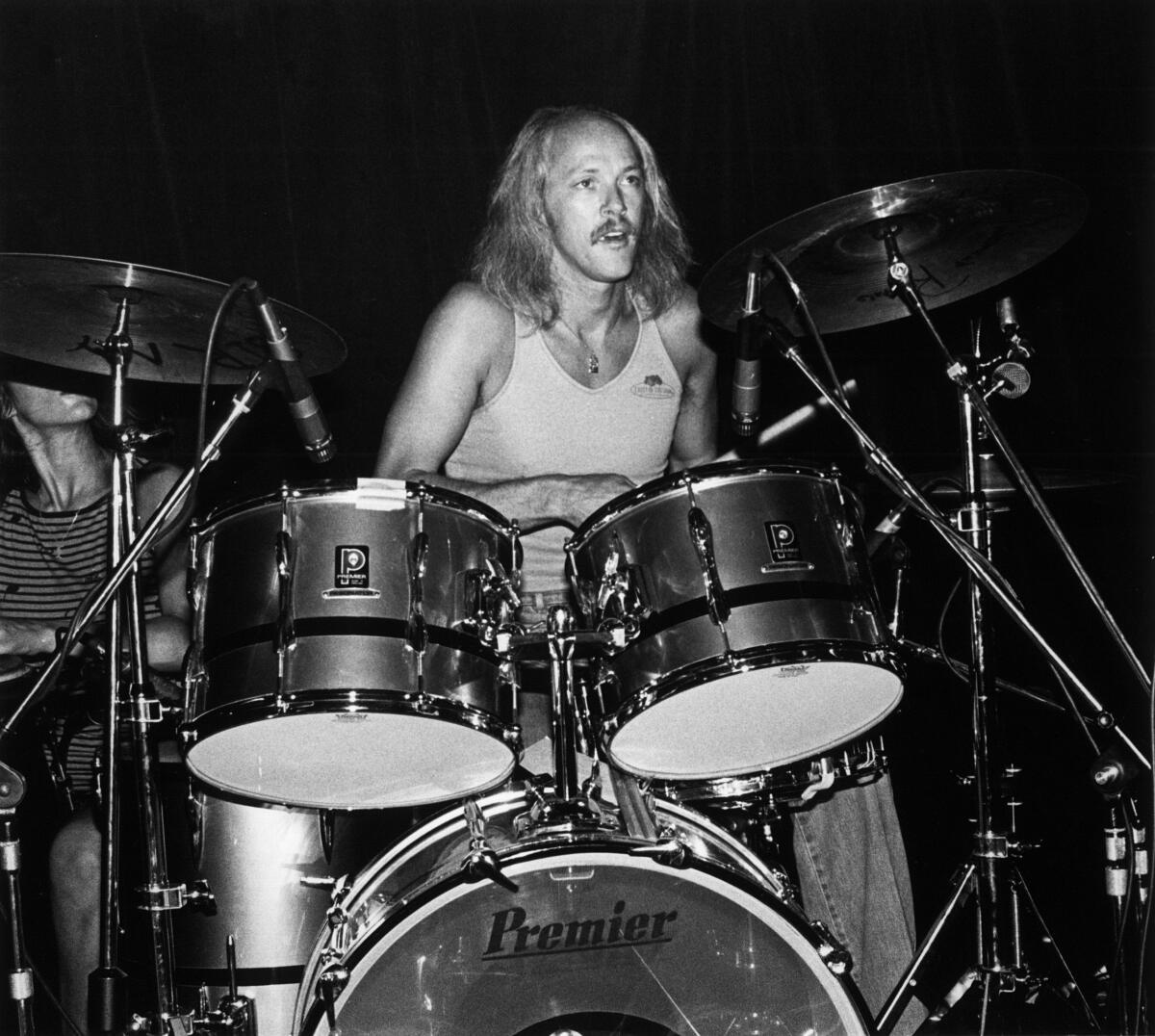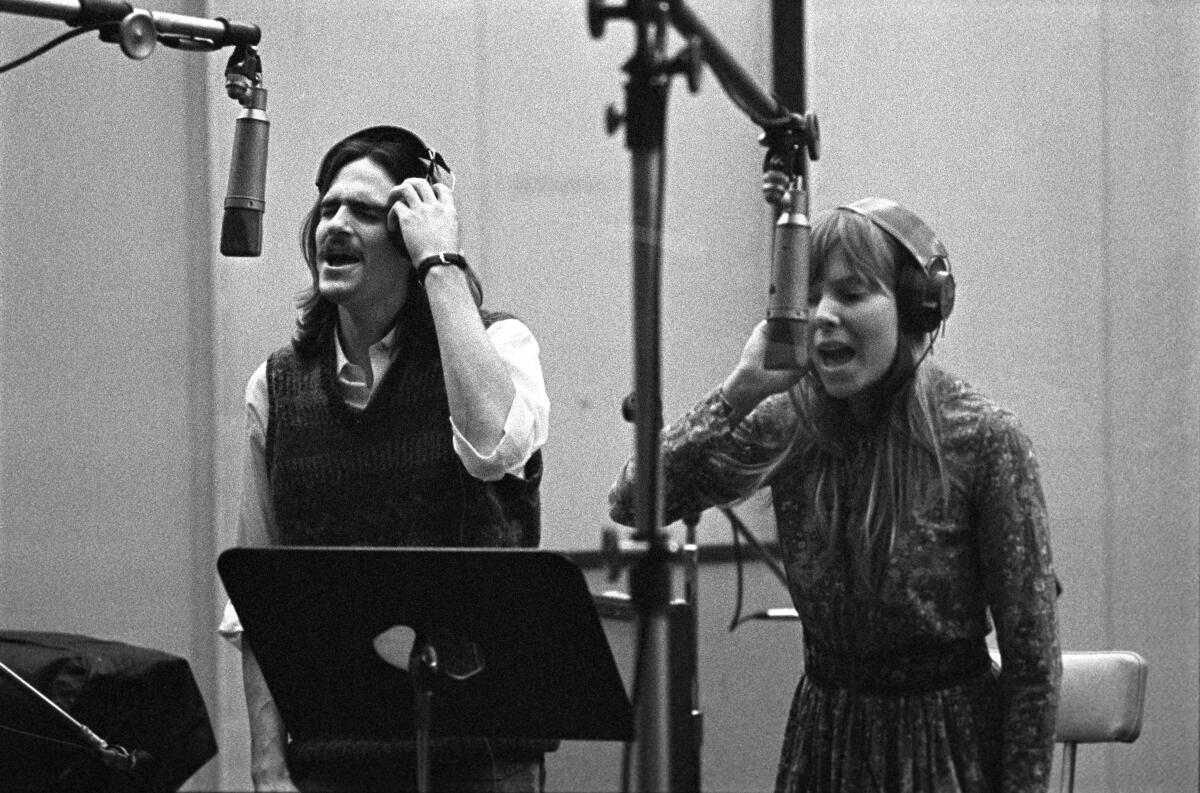Joni Mitchell asked this L.A. drummer for help on ‘Blue.’ The rest is music history

- Share via
Los Angeles session drummer Russ Kunkel has played on hundreds of recordings over the years, but he is best known for driving the rhythm on a series of 1970s folk-rock and FM radio classics by artists including James Taylor, Carole King, Jackson Browne, Linda Ronstadt, Bob Dylan, Stevie Nicks, Crosby, Stills and Nash and Joni Mitchell.
Now 72, Kunkel was in his early 20s when Mitchell, fresh from a trip overseas, asked whether he’d help on a sparse new album called “Blue” she was working on. Kunkel, who refers to his friend as Joan, also worked on her 1972 album, “For the Roses.” He recalled during a recent conversation how he ended up contributing the percussion parts on “Blue.”
David Crosby on dinner with Joni, Phoebe Bridgers and the 50th anniversary of his haunted solo debut
David Crosby was grieving his girlfriend’s death when he and friends made ‘If I Could Only Remember My Name.’ Panned in 1971, it’s now a classic.
How did you come to play on “Blue”?
I met Joan at Sunset Sound, when David Crosby produced her first record [in late 1967]. I was working on another project; I’m not really sure what it was. I became very busy around 1970 and ’71. Not only was I playing on Joni Mitchell’s “Blue,” but also James Taylor’s “Sweet Baby James” and “Tapestry” with Carole [King]. The musical muses were very busy in California. At the time, my wife, Leah, and I were living in a studio apartment that I had built above [Leah’s sister] Cass Elliot’s garage in Laurel Canyon off of Woodrow Wilson.
What did you know about the “Blue” sessions before going in?
It was recorded after “Sweet Baby James,” and I think at the time, Joan was seeing James Taylor. I was part of James’ band, and Joan wanted me to play on her record, to come down and play some percussion. She came up to Cass’ house one day to play me some of the songs — not all of them — just to get an idea before we went to the studio. I had figured that I would probably be playing percussion on them more than I would be full drums, but I’d have the drums there anyway.
At what point in the recording process of “Blue” did you come in?
Most of “Blue” was already recorded — just her and [engineer] Henry Lewy. Joan is such a fantastic musician. She played the dulcimer. She played guitar. She played piano. But a lot of people overlook what a great rhythm player she is. She thinks a lot like a drummer. If you just listen to her strum the guitar, she plays with an acute understanding of the rhythm and the pocket of the song. So it was so easy for me to come up with simple little parts that helped support the rhythm she was already playing — like the conga part of “Carey.” I think there are a couple of songs that I only played shaker and a little conga or something.

I hear some high-hat in there too.
On “California.” I’m actually playing a full drum part, but it’s with brushes. A lot of the backbeats are on the high-hat or really lightly on the snare drum. I remember playing that with James Taylor; we overdubbed together, or one right after the other. But there wasn’t a process or a whole band being in there. She put down a lot of her parts first, because I don’t ever remember being in the studio playing while she was playing and singing.
You were at A&M Studios. What do you remember about the environment?
We cut Carole’s “Tapestry” in [Studio] B, and Joni cut “Blue” in C. Very, very small. God, it’s such a tiny room. There was a set of congas, and one was a tumba that happened to be sitting in the corner. Its head was cracked; it had a rip in it so it couldn’t be tuned up but it had this really low tone to it. I ended up using that on “Carey.” I think Stephen [Stills] and I overdubbed together. He played bass, and I played my part, and then I think I overdubbed the shaker.
Is “Blue” something you return to as a listener?
Oh, absolutely. It’s just one of those iconic albums. Being a part of those three records — “Sweet Baby James,” “Tapestry” and “Blue” — solidified my place in musical history, however small. Three of the most influential records ever made, and I got to play on them within two years. If that’s all that I ever did, I would be happy.
More to Read
The biggest entertainment stories
Get our big stories about Hollywood, film, television, music, arts, culture and more right in your inbox as soon as they publish.
You may occasionally receive promotional content from the Los Angeles Times.












